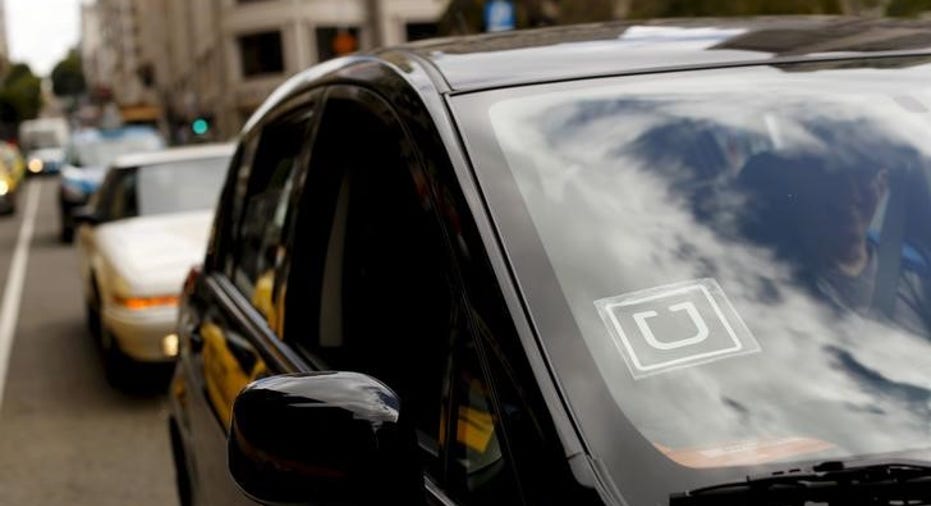Uber to allow tips for drivers, kicking off '180 days of change'

For the first time, Uber will allow passengers in the U.S. to tip their drivers through the ride-sharing company’s app.
The move kicks off a new initiative at Uber to reshape the company, which has come under scrutiny over allegations of harassment throughout its corporate ranks.
Uber on Tuesday announced multiple new options designed to benefit its drivers. Beyond the addition of tips, Uber has added a feature that charges riders by the minute if their Uber car has to wait more than two minutes. Uber also said customers will now have two minutes, rather than five minutes, to cancel a ride before they are charged a $5 cancellation fee.
“Cuts to driver pay across the ride-hail industry have made tipping income more important than ever,” Jim Conigliaro Jr., founder of the Independent Drivers Guild, said in an emailed statement.
Uber won't take any part of the tips given drivers. The San Francisco company will continue to collect a portion of ride-cancellation fees, as well as the new waiting-time charges.
The tipping option, long available in the app of Uber rival Lyft, will be available beginning Tuesday in three cities — Seattle, Houston and Minneapolis. Uber plans to make it a staple in its app in all U.S. cities by the end of July. The other features will roll out in August.
The attempt to smooth over its sometimes testy relationship with drivers is part of a broader effort to reverse the damage done to Uber's reputation by revelations of sexual harassment in its offices, allegations of trade secrets theft and an investigation into its efforts to mislead government regulators.
The expanded earnings opportunities are the first step in what Uber is billing as "180 days of change" for its U.S. drivers. Holt declined to describe what is planned during the rest of the campaign.
While building the world's biggest ride-hailing service over the past eight years, Uber also developed a reputation for cutthroat tactics that have occasionally outraged government regulators, its drivers, its riders and even its own employees.
The company's hard-charging style also has caused legal headaches. The U.S. Justice Department is investigating Uber's past usage of phony software designed to thwart regulators trying to curb the growth of its service. Uber also is fighting allegations that it's relying on a key piece of technology stolen from Google spin-off Waymo to build a fleet of self-driving cars.
Drivers aren't the only people Uber is trying to treat better. After an internal investigation uncovered multiple instances of sexual harassment, bullying and other boorish behavior within the company, Uber fired more than 20 employees and pledged to create a more harmonious culture for its employees.
A more extensive report compiled by the law firm of former U.S. Attorney General Eric Holder chastised the company's leadership and recommended a long list of changes that Uber's board adopted. When it released the Holder report, Uber also said Kalanick was taking an indefinite leave of absence amid criticism of his free-wheeling management style and following the death of his mother in a boating accident.
As part of its penance, Uber emailed a letter to riders in New York city last week apologizing for its missteps.
"As a company, we have faced some hard truths," Uber wrote. "In expanding so quickly, we failed to prioritize the people that helped get us here. Ultimately, the measure of our success is the satisfaction of our riders, drivers, and employees — and we realize that we have fallen short."
Kalanick exemplified Uber's sometimes uneasy relationship with its drivers earlier this year when he got into an argument with a driver unhappy with his pay. The encounter was captured in a video posted online.
Uber also has wrangled with drivers in the courts over its insistence on classifying them as contractors instead of employees to avoid paying them benefits and overtime. The company so far has prevailed in that battle.
Holt said the company talked to thousands of drivers while listening to plenty of complaints before making the moves to boost drivers' incomes. Uber also is trying to make it easier for drivers to transfer their earnings into personal accounts more quickly. It's also allowing more drivers to designate the routes that they want to travel to keep them closer to a preferred destination.
Uber has business reasons to improve its image. The widespread publicity about the company's bad behavior threatens to turn off drivers and riders alike, giving them incentive to switch over to Lyft instead.
A backlash like that could deepen Uber's losses, which totaled $2.8 billion last year alone, threatening to make the company less valuable to investors. Uber was valued at nearly $70 billion the last time it raised money.
The Associated Press contributed to this report.



















